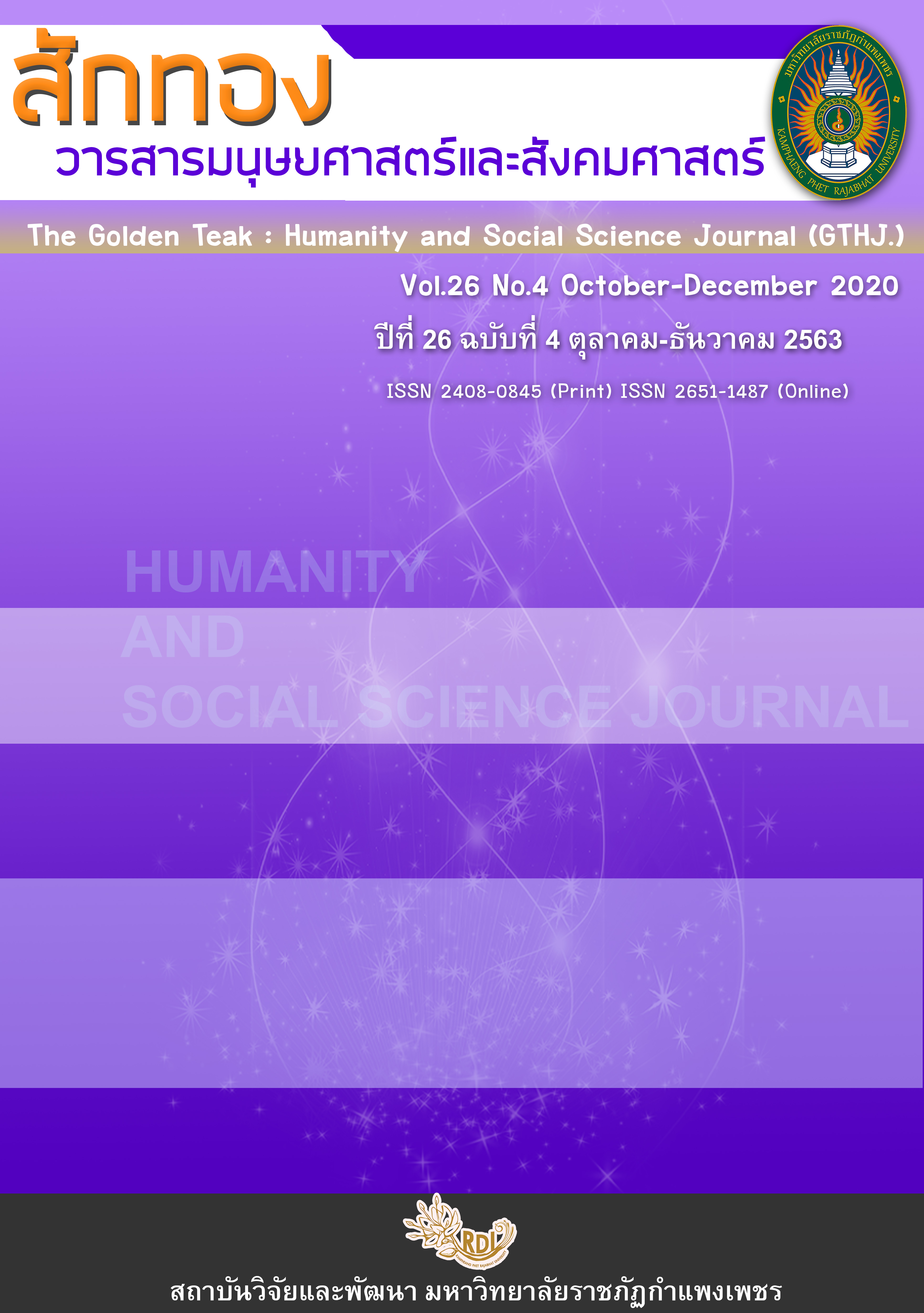Educational Management Guidelines for Promote Vocational Education in High School Level
Main Article Content
Abstract
The main purpose of this research was to present educational management guidelines for vocational education in high school level. The research by mixed research methodology and divided into 4 steps. The first step reviewed the analysis of various policies related to vocational education management in the country and abroad. The second step was studying the educational management potential for promote vocational education in high school level by interviewing of 6 leading school and 4 best practice in vocational education in high school level. The third step was to drafting tentative guidelines for vocational education in high school level based on the data obtained from step 1, 2 and validating the guidelines for its appropriateness through focus group discussion by 8 education planning manpower experts. The fourth step was to evaluate the possibility of applying the educational management guidelines for vocational education in high school level by 125 educational service area directors, school director and academic affairs. Data were analyzed by means and standard deviations. The research founded that the policy on education management to promote vocational education at the secondary level there are important policy issues that should be developed as follows: management students teachers and educational personnel management and budget, the educational management potential for promoting vocational education at the secondary level consists of the external and internal environment of the school which affects the ability or readiness of the educational management and the educational management guidelines. The educational management guidelines for vocational education in high school level consisted of 3 components to be: 1) The scope of administration according economics of education. 2) Educational management guidelines. 3) Supporting factors favorable to the success and driving educational management by educational management process 4 factors SPAN educational management guidelines include 1) Sharing educational resources 2) Educational participation 3) Area-based educational and 4) Educational networks. The appropriateness of the educational management guidelines and the feasibility of applying the guidelines evaluated by educational service area director, school director and academic affairs were at high levels.
Article Details
บทความที่ได้รับการตีพิมพ์เป็นลิขสิทธิ์ของวารสาร สักทอง : วารสารมนุษยศาสตร์และสังคมศาสตร์ สถาบันวิจัยและพัฒนา มหาวิทยาลับราชภัฏกำแพงเพชร
ข้อคิดเห็นใดๆ ที่ปรากฎในวารสารเป็นวรรณกรรมของผู้เขียนโดยเฉพาะ ซึ่งมหาวิทยาลัยราชภัฏกำแพงเพชรและบรรณาธิการไม่จำเป็นต้องเห็นด้วย
References
of Curriculum and Instruction in Basic Vocational Education Basic Level.
Bangkok : The Agricultural Cooperatives Federation of Thailand.
Chandler, A.D. (1962). Strategy and Structure. Chapters in History of the American Industrial
Enterprise, Cambridge, MA : MIT Press.
Chantavanich, S. (1997). Data Analysis in Qualitative Research. Bangkok : Chulalongkorn
University.
Education Council, Office of the. (2015). Research Guided Development of Thailand to
Prepare for the 21st Century. Bangkok : Prigwhan Graphic.
_______. (2017). National Education Plan (B.E. 2560-2579). Bangkok : Prigwhan Graphic.
_______. (2018). Conditions of Thailand Year 2559/2560 Approach to Education
Reform Era to Thailand 4.0. Bangkok : Prigwhan Graphic.
Eisner, E. (1976). Education Connoisseurship and Criticism: Their Form and Functions in
Educational Evaluation. Journal of Aesthetic Education, 39(2), 192-193.
Nakornthap, A. (2012). Priorities and new directions in the study of local management.
[Online]. Available : www.kknontat.com/wp.../ppt Management of local
education.ppt [2016, June 14].
National Economic and Social Development Board, Office of the. (2014). Report on
Economic and Social Development of the Country's 2years Plan for National
Economic and Social Development of the 11th. Bangkok : Sahamitr Printing
and Publishing.
National Education Standards and Quality Assessment (Public Organization), Office for. (2004).
National Education Act B.E.2542 (1999). Bangkok : Office for National Education
Standards and Quality Assessment.
Nonthapala, K. (2008). Guideline for Educational Resources Sharing Among the Schools
in Phetchaburi Educational Service Area 1. Doctor of Education Program in
Educational Administration, Khon Kaen University.
Office of the Basic Education Commission, Office of the. (2001). Guidelines for schools on
the state (Charter School) : Lessons from abroad. Bangkok : T P Print.
Patrawart, K. (2015, January 30). Quality Learning Foundation Offering Vocational Courses
for Reduce Students Problems. Komchadluek Newspaper, pp.10-13.
_______. (2014). Open up the province's educational index in Thailand
Opportunities for educational reform by using the area as a working base.
Journal of the United Nations Development Programme [Online Serial].
Available : http://apps.qlf.or.th/member/UploadedFiles/prefix-06062557-043420-
2Mw1R1.pdf [2018, June 17].
Rittidat, N. (2552). Development of Management Model for Dual Vocational Education
System Through Provincial Networking Manpower Centre. Doctor of Philosophy
Graduate School of King Mongkut's University of Technology North Bangkok.
Schaeffer, J.A. (1992). Effective parent involvement in secondary school of Texas Identified as
exemplary 1982-1989. Dissertation Abstracts Internation, 53(6),1757.
Sornnil, B., et al. (2005). Research Directions Vocational Education and Technology.
Bangkok : Office of the Education Council.
Suntrayuth, T. (2010). Educational Management Economics. Bangkok : Netikun Printing
House.
Swierczek, F.W. (1988). Culture and Training. Training and Development and Project
Management Lesson Learn from ODA, Hanoi, Vietnam.
Tansri, L. (2011). Factors Influencing Students to Choose to Study at Diploma
Roi-et Vocational College. Master of Business Administration, Khon Kaen University.
Thephp̣hibal, P. (2009). Factors Affecting Success in Private School Administration in
General Education at the Basic Education Level in the Southern Region of
Thailand. Doctor of Philosophy Graduate School of Ramkhamhaeng University
Thomas R. Dye. (1984). Understanding Public Policy. United States : Prentice Hall.
Uamsri, W. (2012). The success factors in developing educational, vocational
agriculture AEC. Bangkok : Office of the Vocational Education Commission.
Vedung, Evert. (2008). Public policy and program evaluation. (3 th ed.). London : Transaction
Publication.
Verasombat, T. (2014). Policy Recommendations Preparation of Labor in the Automotive
and Electronic Industries. Bangkok : Parbpim Printing.
Wongprasong, T. (2015). Armed with Learning Skills for Employment. [Online Serial].
Available : http://apps.qlf.or.th/member/UploadedFiles/prefix-26062558-114006-sF12D1.pdf [2018, June 17].
Wongsanusit, W. (2005). Development of curriculum management in dual vocational
training in certificate level (2002); a case study in building construction division
The Institute of Eastern Vocational Education. Master of Industrial Education,
King Mongkut's Institute of Technology.


